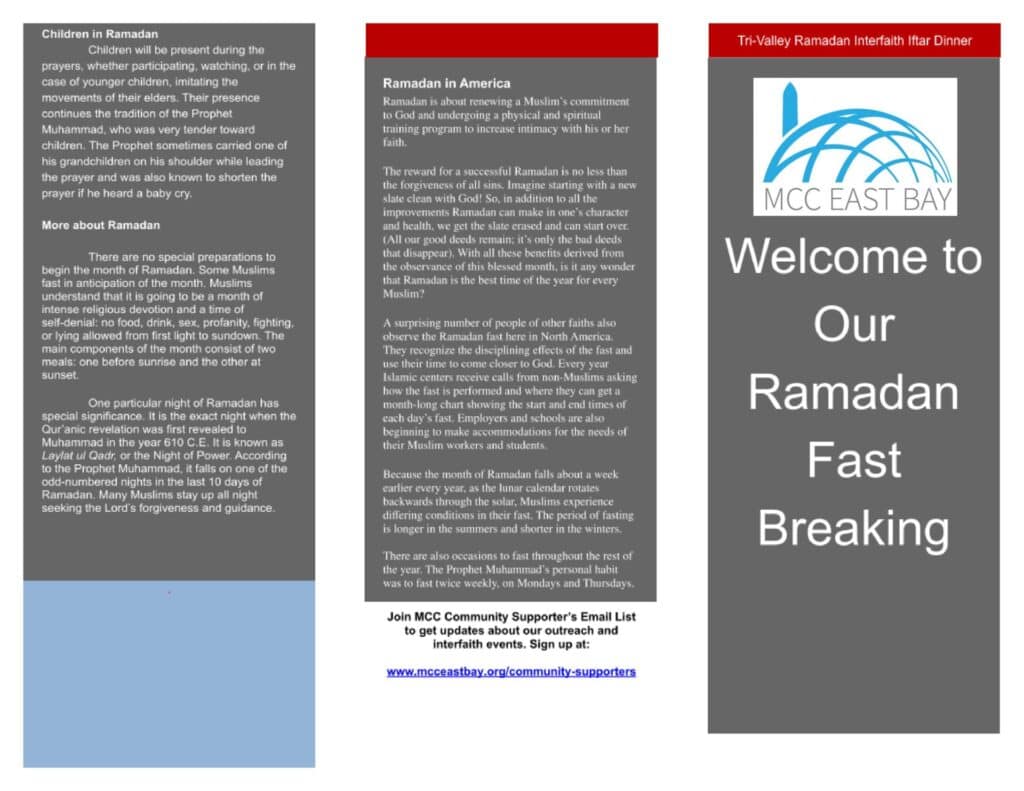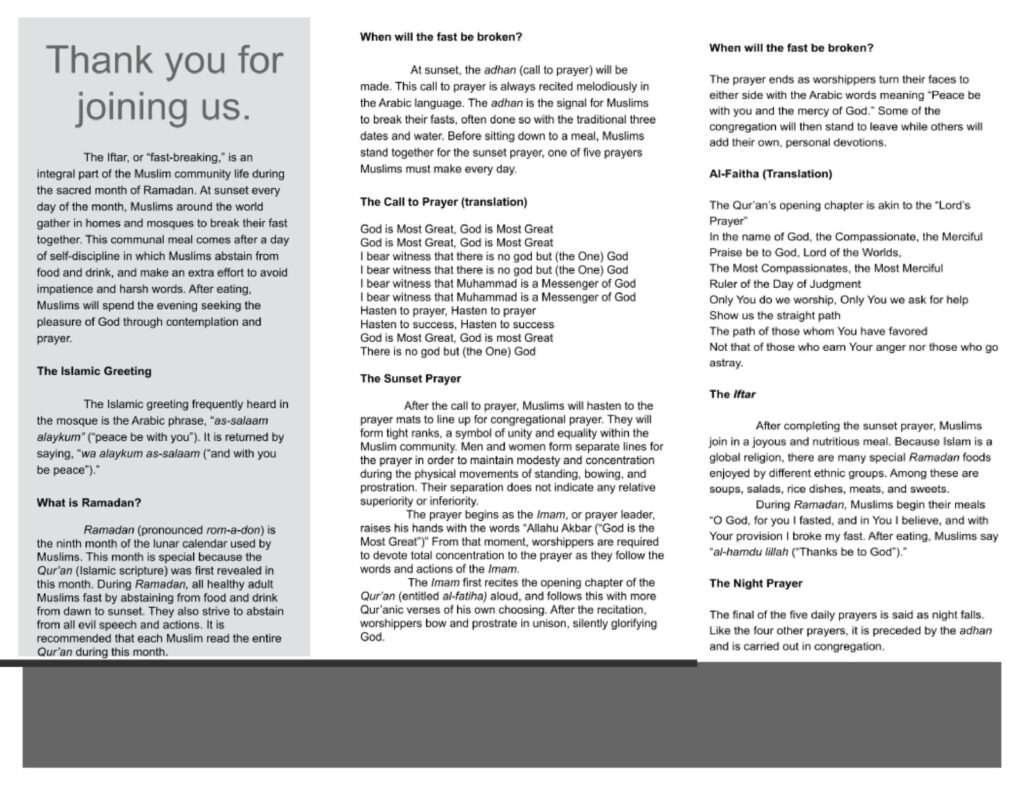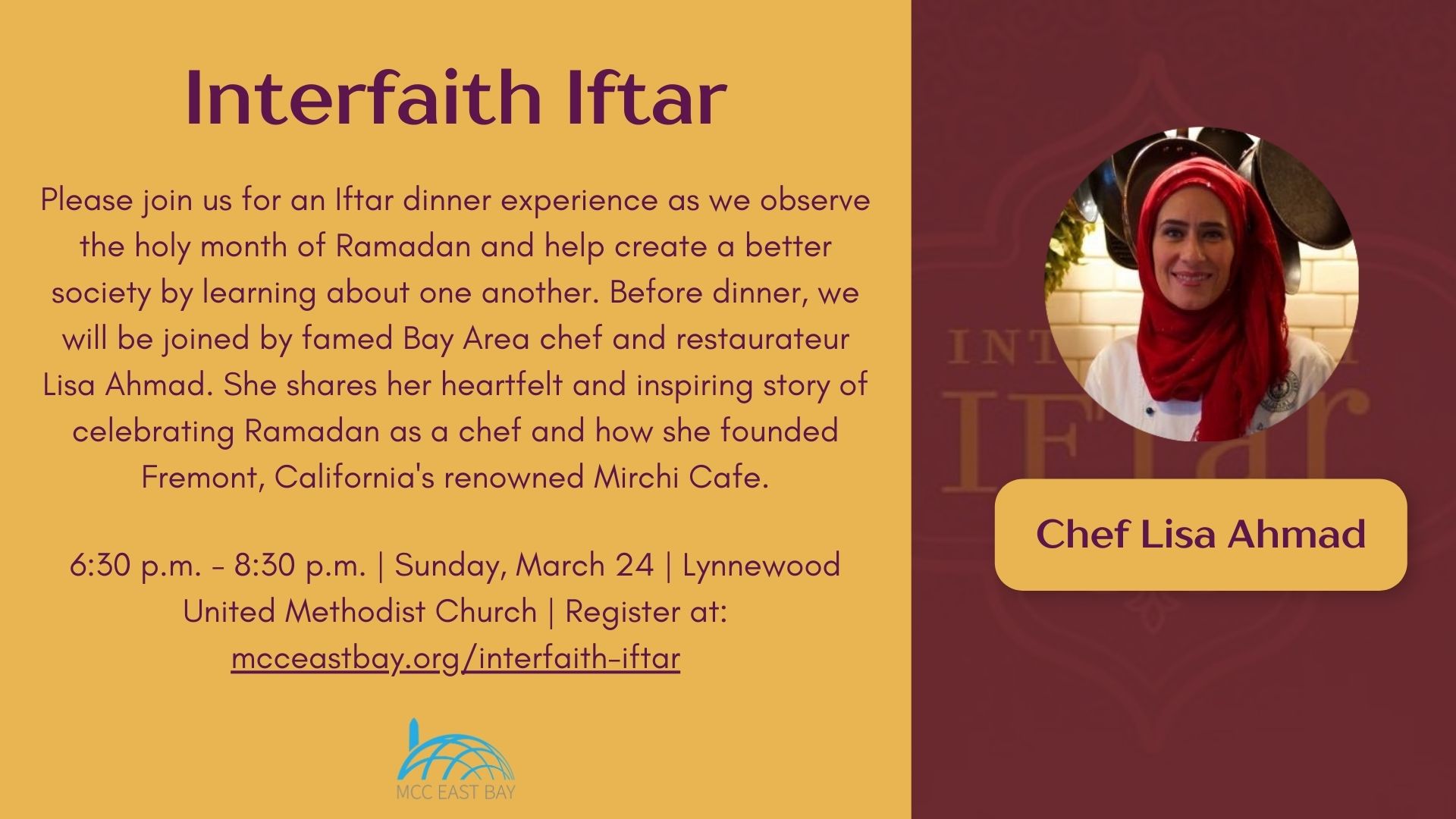Please join us this Sunday evening for an Iftar dinner experience as we observe the holy month of Ramadan and help create a better society by learning about one another. Before dinner, we will be joined by famed Bay Area chef and restaurateur Lisa Ahmad. She shares her heartfelt and inspiring story of celebrating Ramadan as a chef and how she founded Fremont, California’s renowned Mirchi Cafe.
6:30 p.m. – 8:30 p.m. | Sunday, March 24 | Lynnewood United Methodist Church, 4444 Black Ave, Pleasanton, CA 94566 | Register at: HTTP://mcceastbay.org/interfaith-iftar
Space is limited at this interfaith Iftar, which is graciously hosted in the Fellowship Hall at Lynnewood UMC.
MCC congregation members: please attend ONLY if they accompany a friend, co-worker, or neighbor of another faith or nonfaith.
Here is an interview with Lisa: https://diffusedcongruence.podbean.com/e/episode-83-lisa-ahmed/
Iftar means ‘fast-breaking,’ and it is an integral part of the Muslim community’s life during the sacred month of Ramadan. Muslims break their daily Ramadan fast with a community dinner called an “iftar.”
Please RSVP your attendance so we can make sure to have adequate food.
Interfaith Iftar Event Schedule
- – 6:15 p.m. – Arrival & Socializing
- – 6:30 p.m. – The program begins with Lisa Ahmad
- – 7:37 p.m. – Call to Prayer and Breaking of Fast with dates and water
- – 7:40 p.m. – Prayer at Sunset in Prayer Hall (Maghrib) followed by Iftar Dinner in Banquet Fellowship Hall
This is the fifth community Iftar in the Tri-Valley.
- – Here is the 2017: “What Ramadan Means to Me:” https://youtu.be/tiJgEJT-DM8
- – Here is the 2018 “Why Faith Matters:” https://youtu.be/5J8rL9Hepog
- – Here is the 2019 “Loving Across the Difference”: https://youtu.be/JzK7JexOxLw
- – Here is the 2022: “Loving Across the Difference”: https://youtu.be/Hb8_0IUwCBU
- – Here is the 2023: “Moses in Islamic & Jewish Tradition”: https://www.youtube.com/watch?v=DU_na-MYy9Y&t
The Holy month of Ramadan
“Iftar” is the fast-breaking meal observed each evening at sundown during the holy month of Ramadan. The Interfaith Iftar Dinner allows the whole community to join our Muslim friends for an evening meal as they break their Ramadan fast.
Ramadan in America
Ramadan is about renewing a Muslim’s commitment to God and undergoing a physical and spiritual training program to increase intimacy with his or her faith.
The reward for a successful Ramadan is no less than the forgiveness of all sins. Imagine starting with a new slate clean with God! So, in addition to all the improvements Ramadan can make in one’s character and health, we get the slate erased and can start over. (All our good deeds remain; it’s only the bad deeds that disappear). With all these benefits derived from the observance of this blessed month, is it any wonder that Ramadan is the best time of the year for every Muslim?
A surprising number of people of other faiths also observe the Ramadan fast here in North America. They recognize the disciplining effects of the fast and use their time to come closer to God. Every year, Islamic centers receive calls from non-Muslims asking how the fast is performed and where they can get a month-long chart showing the start and end times of each day’s fast. Employers and schools are also beginning to make accommodations for the needs of their Muslim workers and students.
Because the month of Ramadan falls about a week earlier every year, as the lunar calendar rotates backward through the solar, Muslims experience differing conditions in their fast. The fasting period is more extended in the summer and shorter in the winter.
There are also occasions to fast throughout the rest of the year. The Prophet Muhammad’s habit was to fast twice weekly, Mondays and Thursdays.
Children in Ramadan
Children will be present during the prayers, whether participating, watching, or, in the case of younger children, imitating the movements of their elders. Their presence continues the tradition of the Prophet Muhammad, who was very tender toward children. The Prophet sometimes carried one of his grandchildren on his shoulder while leading the prayer and was also known to shorten the prayer if he heard a baby cry.
More about Ramadan
There are no special preparations to begin the month of Ramadan. Some Muslims fast in anticipation of the month. Muslims understand that it is going to be a month of intense religious devotion and a time of self-denial: no food, drink, sex, profanity, fighting, or lying allowed from first light to sundown. The main components of the month consist of two meals: one before sunrise and the other at sunset.
One particular night of Ramadan has special significance. It is the exact night the Qur’anic revelation was first revealed to Muhammad in 610 C.E. It is known as Laylat ul Qadr, or the Night of Power. According to the Prophet Muhammad, it falls on one of the odd-numbered nights in the last ten days of Ramadan. Many Muslims stay up all night seeking the Lord’s forgiveness and guidance.
Thank you for joining us.
The Iftar, or “fast-breaking,” is an integral part of the Muslim community’s life during the sacred month of Ramadan. At sunset every day of the month, Muslims gather in homes and mosques to break their fast together. This communal meal comes after a day of self-discipline in which Muslims abstain from food and drink and make an extra effort to avoid impatience and harsh words. After eating, Muslims will spend the evening seeking the pleasure of God through contemplation and prayer.
The Islamic Greeting
The Islamic greeting frequently heard in the mosque is the Arabic phrase, “as-salaam alaykum” (“peace be with you”). It is returned by saying, “wa alaykum as-salaam (“and with you be peace”).”
What is Ramadan?
Ramadan (pronounced rom-a-don) is the ninth month of the lunar calendar used by Muslims. This month is special because the Qur’an (Islamic scripture) was first revealed in this month. During Ramadan, all healthy adult Muslims fast by abstaining from food and drink from dawn to sunset. They also strive to abstain from all evil speech and actions. It is recommended that each Muslim read the entire Qur’an during this month.
When will the fast be broken?
At sunset, the adhan (call to prayer) will be made. This call to prayer is always recited melodiously in the Arabic language. The adhan signals Muslims to break their fasts, often done with the traditional three dates and water. Before sitting down to a meal, Muslims stand together for the sunset prayer, one of five prayers Muslims must make daily.
The Call to Prayer (translation)
God is Most Great; God is Most Great
God is Most Great; God is Most Great
I bear witness that there is no god but (the One) God
I bear witness that there is no god but (the One) God
I bear witness that Muhammad is a Messenger of God
I bear witness that Muhammad is a Messenger of God
Hasten to prayer, Hasten to prayer
Hasten to success, Hasten to success
God is Most Great; God is Most Great
There is no god but (the One) God
The Sunset Prayer
After the call to prayer, Muslims will hasten to the mats to line up for congregational prayer. They will form tight ranks, symbolizing unity and equality within the Muslim community. Men and women form separate lines for the prayer to maintain modesty and concentration during the physical movements of standing, bowing, and prostration. Their separation does not indicate any relative superiority or inferiority.
The prayer begins as the Imam, or prayer leader, raises his hands with the words “Allahu Akbar (“God is the Most Great”)” From that moment, worshippers are required to devote total concentration to the prayer as they follow the words and actions of the Imam.
The Imam first recites the opening chapter of the Qur’an (entitled al-fatiha) aloud and follows this with more Qur’anic verses of his choosing. After the recitation, worshippers bow and prostrate in unison, silently glorifying God.
When will the fast be broken?
The prayer ends as worshippers turn their faces to either side with the Arabic words “Peace be with you and the mercy of God.” Some of the congregation will then stand to leave, while others will add their devotions.
Al-Faitha (Translation)
The Qur’an’s opening chapter is akin to the “Lord’s Prayer”
In the name of God, the Compassionate, the Merciful
Praise be to God, Lord of the Worlds,
The Most Compassionate, the Most Merciful
Ruler of the Day of Judgment
Only You do we worship, Only You we ask for help
Show us the straight path
The path of those whom You have favored
Not that of those who earn Your anger nor those who go astray.
The Iftar
After completing the sunset prayer, Muslims join in a joyous and nutritious meal. Because Islam is a global religion, many special Ramadan foods are enjoyed by different ethnic groups: soups, salads, rice dishes, meats, and sweets.
During Ramadan, Muslims begin their meals “O God, for you I fasted, and in You I believe, and with Your provision I broke my fast. After eating, Muslims say “al-hamdu lillah (“Thanks be to God”).”
The Night Prayer
The final of the five daily prayers is said as night falls. Like the four other prayers, it is preceded by the adhan and is carried out in the congregation.
Questions? events@mcceastbay.org





